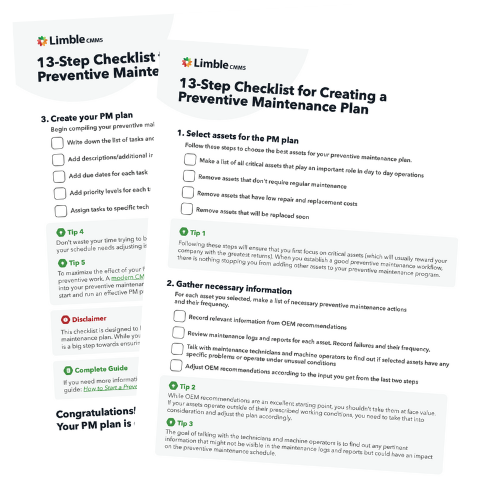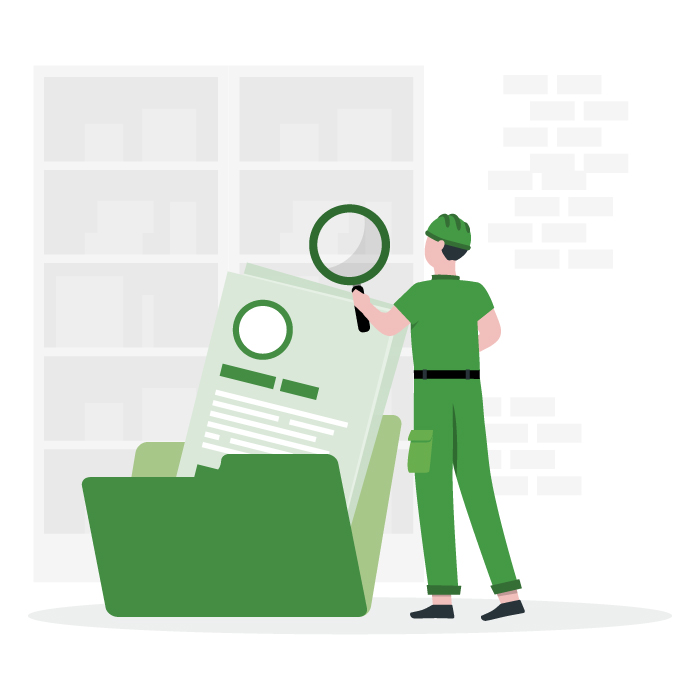Facility Maintenance
Everything you ever needed to know about facility maintenance.
What is facilities maintenance?
Facility maintenance is a comprehensive term, referring to all of the maintenance activities performed within and around commercial and industrial buildings. The objective of facility maintenance is to ensure that these spaces are safe, sanitary, legally compliant, and operating at maximum efficiency.
The approach that your business takes toward facilities maintenance will depend on a number of factors, including the size of your operations, your dependency on certain critical assets, and the availability of maintenance resources.
Table of Contents
- Everything you ever needed to know about facility maintenance.
- What is facilities maintenance?
- Types of facility maintenance
- Checklist for Creating a Preventive Maintenance Plan
- What types of organizations require facilities maintenance programs?
- Facilities maintenance, building maintenance, and property maintenance
- Facilities maintenance challenges
- Facilities maintenance roles
- Benefits of facility maintenance programs
- Facility maintenance tools and techniques
- 5 facilities maintenance best practices
- CMMS and facility maintenance
- Related Content
Types of facility maintenance
Facilities maintenance encompasses the upkeep of building systems like plumbing, electrical and HVAC systems; maintenance of building infrastructure like foundation, roofing, and painting; care for exterior grounds through activities like landscaping and pest control; and much more. And today, more than ever, facilities managers are focused on strategies that improve energy efficiency, enhance sustainability, and rise to meet growing environmental challenges.
As a result of these variables, facilities maintenance can take on a number of different forms. Common types of maintenance include:
- Reactive maintenance, where repairs are made after equipment malfunctions or fails
- Corrective maintenance, which, like reactive maintenance, schedules repairs only after problems occur, but which focuses on long-term correction of equipment failures
- Preventive maintenance, which involves regular, scheduled maintenance to prevent equipment failure before it happens
- Predictive maintenance, which uses advanced technology to monitor equipment performance and forecast maintenance needs
Many businesses use some combination of these strategies to formulate a broader facilities maintenance program.
Checklist for Creating a Preventive Maintenance Plan
Following a consistent Preventive Maintenance Plan can make life easier. Use this checklist to create your own!

What types of organizations require facilities maintenance programs?
Facilities maintenance is essential in a wide variety of industries. Below, we take a closer look at the types of organizations that require facilities maintenance to ensure safe, functional, and efficient operations:
- Commercial office buildings require robust facilities maintenance programs to manage HVAC systems, elevators, fire safety systems, and more.
- Hospitality venues such as hotels, resorts and casinos require upkeep both in guest rooms and common spaces, taking on tasks related to plumbing, electrical, and HVAC systems as well as complex systems like spas, pools, gyms, and entertainment spaces.
- Healthcare facilities require both general facilities maintenance (i.e. electric, plumbing, HVAC) as well as specialized maintenance for care of medical equipment, assurance of sterile environments, and upkeep of emergency power systems.
- Retail properties rely on robust facilities maintenance programs to keep spaces clean, safe, and inviting to customers through tasks such as lighting replacement, sign upkeep, escalator maintenance, security system checks, and parking lot maintenance.
- Manufacturing plants are highly dependent on robust facilities maintenance programs for upkeep of physical assets including industrial machinery, production equipment, and various infrastructural features.
Facilities maintenance, building maintenance, and property maintenance
Before we proceed, let’s clarify a few key terms. Building maintenance and property maintenance are both closely related to facilities maintenance. Indeed, all three terms may include many of the same activities.
There are, however, a few important distinctions in the scope and focus of these three terms. In fact, a comprehensive maintenance strategy requires careful consideration of all three. Below, we examine some of these distinctions.
- Facilities maintenance covers the broad range of activities required to keep your facilities operational, safe, and efficient, and will include both the physical building and the equipment and systems used within. Facilities maintenance is essential for the upkeep of commercial buildings, industrial campuses, hospitals, schools, government buildings, and more. In short, facilities maintenance is focused on the whole environment encompassed by your business operation.
- Building maintenance is more specific in scope than facilities maintenance, focusing primarily on your building’s physical structure, with an emphasis on tasks like roofing repair, painting, and ensuring structural integrity. While more narrow in focus than facilities maintenance, its applications are more widespread, with building maintenance playing an important part in the commercial operations noted above as well as in the full spectrum of residential buildings. In addition to upkeep and repair, building maintenance is critical to extending the lifespan of structures.
- Property maintenance generally includes the activities involved in building maintenance. But it also refers to upkeep of exterior spaces as well. A common feature of residential properties, apartment complexes, and communities, property maintenance extends from building upkeep (like roofing, painting, and foundation care) to include activities like landscaping, paving, and seasonal care such as snow or leaf removal. In addition to the safety and upkeep generally encompassed by facilities and building maintenance, property maintenance includes an aesthetic component, with maintenance activities also focused on ensuring a visually pleasing, presentable, and welcoming property.
Altogether, these dimensions add up to a comprehensive maintenance program, where facilities maintenance ensures that systems within and around the facility are functioning efficiently, where building maintenance addresses the structural features of the building itself, and where property maintenance emphasizes the usability, livability, and aesthetic appeal of the property.
Facilities maintenance challenges
Facilities maintenance plays a critical role in ensuring operational efficiency and continuity. But facilities maintenance professionals do face a number of challenges in meeting their responsibilities.
- Budget constraints: Facilities maintenance teams may be required to work on fixed budgets, which can result in deferred maintenance activities and potentially higher long-term costs.
- Aging infrastructure: Facilities maintenance professionals may be required to make more frequent repairs to outdated systems and aging equipment. More than half of respondents to Limble’s recent survey of facilities management and maintenance professionals named an aging infrastructure as one their top challenges.
- Regulatory compliance: Effective facilities maintenance is essential to remaining aligned with local, state, and federal regulations, which means facilities maintenance professionals must have a full understanding of frequently shifting safety, environmental, and accessibility standards.
- Sustainability: Facilities managers are under increasing pressure to implement sustainable practices and improve energy efficiency, both as a way of ensuring regulatory compliance and improving profit margins.
- Data Management: Effective maintenance relies on both the collection and analysis of vast amounts of data, which places the onus on facilities managers to leverage leading edge data management tools and strategies.
Facilities maintenance roles
Your facilities maintenance department will include a variety of maintenance professionals with important designated roles. The following facility maintenance workers may play a key role in formulating and executing on your strategies:
- Facilities manager: Tasked with overseeing all aspects of facilities maintenance, including scheduling, budgeting, and compliance with safety regulations, as well as strategic alignment of maintenance activities with broader organizational goals
- Maintenance technicians: Tasked with day-to-day repair and maintenance tasks such as electrical, plumbing, and HVAC systems, as well as general repair work, routine equipment servicing, and parts replacement
- Maintenance supervisors: Tasked with overseeing activities of maintenance technicians, providing quality assurance, and working with facilities managers to ensure maintenance operations match the planning, priorities, and expectations of organizational leadership
- Building engineer: Tasked with overseeing technical aspects of building systems, including auditing, testing, and upgrading mechanical, electrical, and plumbing systems
- Groundskeeper: Tasked with maintaining outdoor spaces through tasks such as landscaping, janitorial duties, gardening, snow removal, and upkeep of outdoor fixtures.
Benefits of facility maintenance programs
If your organization relies on its physical assets, buildings, and infrastructure to operate, facility maintenance is essential to the long-term survival of your business. Here are just a few of the indispensable benefits of an effective facilities maintenance program:
Optimized performance
A comprehensive facilities maintenance program will help your organization better streamline, organize and plan maintenance activities by:
- Ensuring systems and equipment operate at peak efficiency
- Reducing the likelihood of unexpected breakdowns and prolonged downtime
- Allowing for better allocation of resources including spare parts, raw materials, and tools
Extended equipment lifespan
A robust facilities maintenance program raises the life expectancy of your machinery, equipment, and properties by:
- Facilitating preventive care such as routine maintenance to maximize your investment in physical assets
- Utilizing data analytics to anticipate and prevent maintenance issues
- Enabling timely intervention in order to prolong equipment usability
Cost savings
A reliable facilities maintenance program can significantly improve the bottom line for your organization by:
- Reducing the likelihood of major equipment failures, which can lead to costly repairs or replacements
- Identifying small maintenance issues before they can escalate into more costly, system-wide problems
- Improving energy efficiency by keeping equipment in optimal working condition
Improved safety and compliance
Your facilities maintenance strategy will play a central role in helping your organization stay on top of regulatory responsibilities by:
- Lowering the risk of accidents caused by malfunctioning equipment or systems
- Creating a safe working environment for personnel, visitors, and those in the surrounding communities
- Achieving compliance with regulations concerning equipment safety, environmental impact, and operational standards, and consequently avoiding potentially costly penalties and fines
Data–driven asset management
A robust facilities management program gives you access valuable insights by:
- Using data-driven tools to keep detailed records of all maintenance activities, warranties, and the condition of equipment
- Providing detailed reporting to support better decision-making and planning
- Forecasting future maintenance needs with greater accuracy by using advanced analytics
Facility maintenance tools and techniques
Facility maintenance programs employ a variety of techniques to ensure efficient and effective management of buildings and equipment. Below, we outline strategies commonly associated with facility maintenance programs:
- Preventive maintenance involves regularly scheduled maintenance tasks to prevent equipment breakdowns before they occur, and is essential to reducing the likelihood of equipment failure, preventing unplanned downtime, and extending the lifespan of your physical assets.
- Predictive maintenance relies on real-time data gathered through sensors and IoT devices, which allow maintenance teams to monitor equipment performance and use advanced analytics to forecast maintenance needs.
- Condition monitoring involves continuous monitoring of key performance indicators using monitoring technology such as vibration sensors, thermographic cameras, and acoustic sensors to identify deviations from normal operating conditions.
- A CMMS (Computerized Maintenance Management System) is a platform that manages all aspects of your facilities maintenance operation including scheduling, inventory management, work order tracking, and enhanced leveraging of data analytics, all of which can make maintenance operations more efficient, cost effective, and streamlined.
5 facilities maintenance best practices
Effective facilities maintenance can help to automate, streamline, and enhance various aspects of your maintenance operations. However, there are several critical steps that your organization should first take in order to ease implementation.
- Outline clear protocols including the articulation of Standard Operating Procedures (SOPs), the incorporation of maintenance checklists, and regular review of safety guidelines.
- Build out a comprehensive training program for current employees and a robust on-boarding procedure for new hires to ensure that all team members are current on operational procedures and safety standards.
- Transition to preventive maintenance, scheduling regular inspections and time-based servicing in order to reduce the incidence of emergency repairs, prevent unexpected downtime, and improve maintenance team workload management.
- Enhance your inventory management strategy to ensure accuracy of data, improve real time visibility into stock levels, and prevent maintenance delays.
- Utilize advanced facility maintenance software such as a Computerized Maintenance Management System (CMMS), which can dramatically streamline your facility maintenance operations by helping with work order management, task scheduling, productivity tracking, inventory management, and data analytics.
Want to see Limble in action? Get started for free today!
CMMS and facility maintenance
Limble CMMS is a software solution built with the needs of facilities managers at the top of mind. Limble’s key features are meant to streamline, enhance, and optimize the effectiveness of your facility maintenance program by:
- Centralizing asset tracking through a single, user-friendly dashboard
- Streamlining work orders, from creation and assignment to tracking and completion
- Facilitating preventive maintenance with tools for scheduling, automated notifications, procedural checklists, and more
- Optimizing inventory management by tracking stock levels in real time, alerting your team when stock is low, and automating reorder triggers
- Delivering advanced analytics and customized reports, filled with insights into maintenance operations, asset performance, and team productivity
- Enabling field maintenance through Limble’s mobile app and on-the-go CMMS features including barcode scanning and QR codes for advanced inventory tracking and data access
Check out G2’s latest report on CMMS platforms, facility management software, and other solutions to see how Limble outranked competing providers for usability, results, and customer support.


